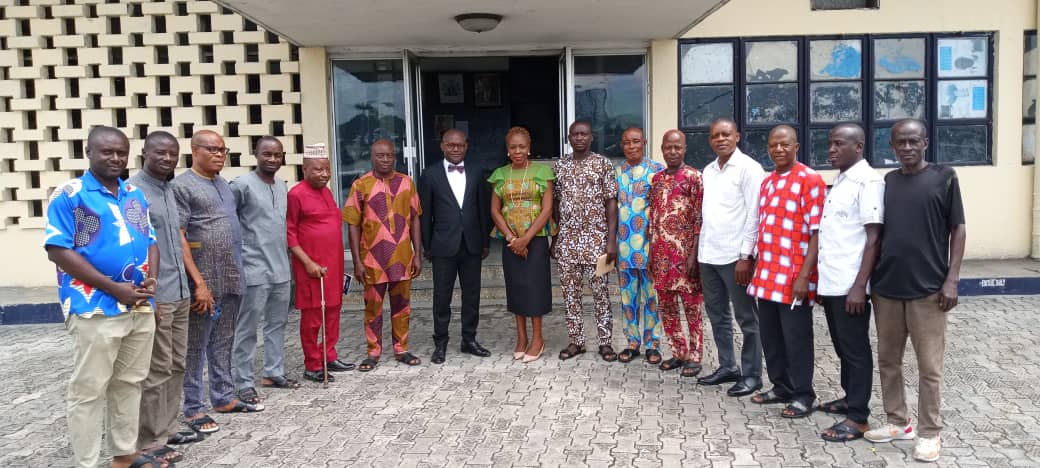Niger Delta
C’River Debunks NBS’ Child Rating

The Cross River State Government has described the state’s rating on child labour by the National Bureau of Statistics (NBS) as “spurious” and not a true reflection of what is happening in the state.
The government demanded to know the parameters used by the NBS to carry out the research that rated Cross River number one in the country involved in child labour with 67.4 percent.
The State Commissioner for Information, Mr. Erasmus Ekpang, who made the demand in an interview with The Tide’s source, said Cross River remained the most “child friendly” state in Nigeria.
Ekpang explained that Cross River showed the value it placed on the rights of every child by being among the first state in the country to domesticate the Child Rights Law.
“The United Nations is aware of what we are doing in this regard. So, it is preposterous for us to degenerate into such a high lows even when there are a number of violations of the law.
“To say the least, we are concerned about such statistics and would want to verify this claim which I still consider as spurious.
“We have continued with sustained advocacy on the existence of the Child Rights Law in the state. The Law provides for criminalisation of violators and offenders of the law.
“As a state, we created a special Ministry to be in charge of this, which is the Ministry of Women Affairs with Desk Offices established in the 18 council areas to cascade this advocacy to the wards and villages.
“Government has gone ahead to involve traditional rulers, opinion leaders and women groups to strengthen this campaign against child labour and child abuse respectively.
“Of course, note that some violators have been and are being prosecuted in the courts. Even in my ministry of information, my orientation department has been doing a lot to sensitise and orientate the citizenry on the existence of the Law and implementation in the state.
“All these are helping and would continue to change the narrative in this regard”, he stated.
The NBS report indicates that over 24 million Nigerian children are involved in child labour, with 14.3 millions of these children engaged in hazardous work as of 2022 when the last report was conducted.
The northwest geopolitical zone bears the brunt of these figures, with the highest number of child labourers (6,407,102) and children in hazardous work (3,266,728).
The South East region emerged the highest in terms of percentage prevalence of child labour with nearly half of the children involved in child labour at 49.9 per cent.
Nationally, 39.2 per cent of children (24,673,485) are in child labour, and 22.9 per cent (14,390,353) are involved in hazardous work, painting a grim picture of the conditions under which nearly two out of every five Nigerian children live.
The report also shows that children in the 5–17 age group in child labour commit an average of 14.6 hours of work per week.
The data further revealed the top 10 states grappling with high percentage of child labour in Nigeria.
According to the data, Cross River, Yobe, Abia, Plateau and Taraba are are top five with 58.6, 58.9, 60.1, 62.6, and 67.4 percent respectively.
Taraba State is followed by Ebonyi with 56.2 per cent, Imo with 56.2 percent, Kogi with 54.4 per cent while Bauchi and Akwa Ibom came 9th and 10th with 53.3 and 52.2 percent respectively.
Niger Delta
RSNC Head Charges NAOMEW On Professionalism, Effective Service Delivery

The Head of Rivers State Newspaper Corporation, Mrs Stella Dornubari Gbaraba, has charged the National Association of Ogoni Media House Workers (NAOMEW) World Wide, to be committed to professionalism, patriotism and effective service delivery in the discharge of their duties and rendering of patriotic gestures.
Mrs Gbaraba gave the charge yesterday when the NAOMEW, The Tide Chapter paid her a courtesy call in her office in Port Harcourt.
She expressed deep appreciation for the visit, and assured the Association of her commitment to being a worthy Ogoni Ambassador like late Mr Augustine Nwikinaka, former General Manager of the corporation, to promote the fortunes of the corporation, while counting on their unflinching encouragement, prayers and support to succeed.
“ I am very happy to receive the National Association of Ogoni Media House Workers (The Tide Chapter) today in my office. I am glad you people came to my office, for those that know me in a short while in the corporation, I am a serious-minded person. I heard that the time the corporation was functioning well was under the leadership of late Austin Nwikinaka. Any where I go to, I will rather come down and show working example and that is what the Ogoni person is known for. So I am always proud to associate myself with an Ogoni man, so your support means so much to me,” Mrs Gbaraba said.
She assured them of running an open-door policy in the management of the corporation, and urged stronger partnership between NAOMEW, other unions, interest groups, corporate organisations, institutions and the Rivers State Newspaper Corporation in professional service delivery.
Speaking on behalf of the NAOMEW, The Tide Chapter, the National Secretary of the association, Comrade Taneh Beemene welcomed her into The Tide family and also congratulated her on her very important appointment.
Taneh, who expressed confidence in her experience and abilities to deliver on her assignments, thanked her for the uncommon feats recorded in the corporation within her brief leadership. He said the corporation has been revived from its comatose status that predated her appointment.
“ Within your short time, you have given the corporation a remarkable facelift. We pray that God should give you the enablement to restore the dignity of the corporation. We have come to inform you that we are solidly behind you and will make our untiring contributions to make you succeed, “ he stated.
In his vote of thanks and closing remarks, the Chairman, National Union of Printing, Publishing and Paper Production Workers (NUPPPPROW), Comrade Keyirale Donatus Nwiueh thanked the Head of the Rivers State Newspaper Corporation, Mrs Stella Dornubari Gbaraba for receiving the association in a warm manner, adding that she should count on the support of the association to succeed.
Kiadum Edookor
Niger Delta
OBALGA Sole Administrator Presents Brand New Fire Extinguishers To Council …Commiserates With Traders Over Rumuomasi Market Fire Incident …Commences Desilting Of Drainages

The Sole Administrator of Obio/Akpor Local Government Council, Dr Clifford Ndu Walter has presented 150 brand new fire extinguishers to the council.
Dr Walter who spoke to newsmen at the council premises at Rumuodumanya said the gesture was part of measures by his administration to ensure safety of lives and council property from unforeseen fire incidents.
He urged the staff of the council to ensure the safety of the extinguishers, while promising to engage experts to teach them how to handle and operate the extinguishers.
Meanwhile, Sole Administrator of Obio Akpor Local Government Council, Dr Clifford Ndu Walter has commiserated with traders at the Rumuomasi Market over the unfortunate fire incident that gutted parts of the market.
Dr Walter who visited the market to assess the level of damage caused by the fire, described it as unfortunate
Addressing the crowd of distressed traders and community members, Dr. Walter acknowledged the historical significance of the market, which was originally built under the administration of the former Obio/Akpor Chairman and current Minister of the Federal Capital Territory, Chief (Barr.) Nyesom Ezenwo Wike, CON.
He noted that preliminary findings suggest the fire may have been caused by an electrical fault, though a full investigation is still underway.
“As a local government, we will constitute a thorough investigation team to determine the root cause of the fire,
“Most importantly, we thank God that no lives were lost. I want to assure our traders that the Local Government will not abandon you.
“We will also work with security operatives to safeguard salvaged goods and prevent further losses,” he said.
He encouraged traders to adopt stricter safety measures, especially concerning electrical appliances in markets prone to fire hazards.
“There are many ways fires can ignite, even without an open flame. Let us all be vigilant and prioritise safety,” he cautioned.
Dr. Walter also commended those who stepped in to assist during the emergency.
“We are grateful to all who helped salvage goods and support affected persons during the crisis. Your kindness embodies the spirit of Obio/Akpor. The forthcoming investigation will help us put preventive structures in place,” he said.
The Chairman of the market, Mr. Prince Adele, who accompanied Dr. Walter, during the inspection, identified K-Lane as the most severely affected area.
A statement by the information officer to the council, Ominini Leslie Wokoma said no incident of death was reported by the traders during the visit.
In another development, the Sole Administrator of Obio/Akpor local government council, Sir Clifford Ndu Walter, has commenced a comprehensive canal clearance campaign with a view to identifying and removal of all blockages including illegal structures hindering the free flow of waters in the area.
A statement from the council Press Secretary, Ominini Leslie Wokoma said during the inspection of key canals in the area, several unauthorised barricades and blockages were discovered and removed.
According to the statement, Dr Walter emphasised that illegal dumping, unapproved structures and poor drainage habits endanger communities and undermine government efforts, adding that his administration is committed to protecting lives and property of the citizens.
It said the Sole Administrator also declared his readiness to ensure that all canals and drainages are cleaned, maintained and functioning effectively.
He also warned against further dumping of waste in waterways, citing impending flooding.

